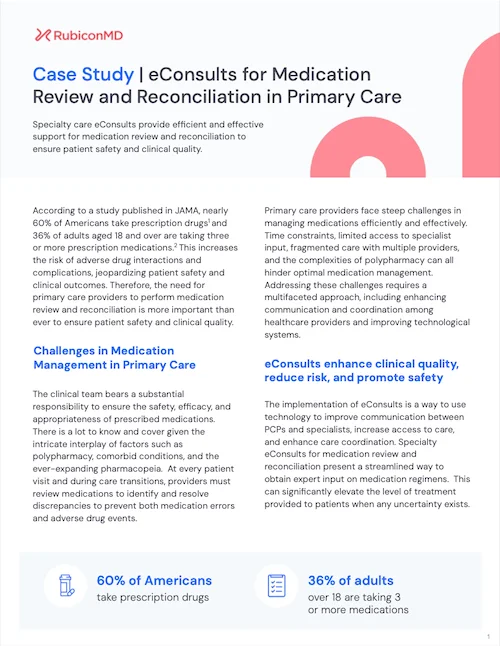eConsults Improve Medication Adherence and Reduce Polypharmacy for PACE Patients
Effective medication management presents challenges for Programs of All-Inclusive Care for the Elderly (PACE) providers. Specialty care eConsults can help…
Attention to the Transgender and Gender Nonconforming (TGNC) community has dramatically increased in the U.S. over the past few years. In June 2020, Federal civil rights law extended its protection from workplace discrimination to gay, lesbian and transgender workers following a Supreme Court ruling. Additionally, the specific issue of treatment of incarcerated TGNC people has also gathered more attention in the past few years, as the current administration has rewritten policies intended to support the health and safety of these inmates.
It is estimated that there are ~1 million transgender adults nationally (1). Despite a growing awareness of transgender health issues and disparities, transgender individuals still experience significant barriers to care and are more likely to be refused care than other populations (2). Teaching of TGNC medicine is limited in medical training (3). Social and institutional stigma persists in many health systems. Stigma, discrimination, and barriers to care experienced by transgender people have been associated with increased risk for suicide (41% or 26X higher than the general population), depression (44.1%) (4) , and HIV (27.7% among transgender women) (5).
Social marginalization experienced by transgender individuals is associated with high rates of homelessness and unemployment, which drives involvement in criminalized survival work, including sex work and substance use. TGNC people also experience increased targeting by law enforcement. These have led to an overrepresentation of transgender individuals in the U.S. prison system, with estimates of lifetime incarceration of 16% to 21% compared to 2.8% to 6.6% for the general U.S. population (6).
RubiconMD’s eConsult platform has been offering a TGNC focused specialty for the past 3 years.
Earlier last year, the RubiconMD team presented its analysis on the impact of eConsults on access to transgender health for primary care clinicians at the National Transgender Health Summit at UCSF. The analysis revealed that 89.5% of eConsults were from community clinics, Federally Qualified Health Centers, and rural areas – settings where an in-person consultation with a TGNC specialist was unlikely to have been an easily accessible and timely option. The top three clinical topic categories included hormone therapy (initiation, titration, side effect management, and drug-drug interaction management), gender affirming surgery, and behavioral health. Primary care clinicians reported a positive experience with an average rating on their satisfaction with the eConsult of 4.89 out of 5. In half of the cases, clinicians reported that the eConsult was educational and in close to one-third of the cases, the eConsult avoided unnecessary diagnostics/procedures, avoided a referral altogether or avoided a referral to the wrong specialty. Also, the majority of eConsult submissions resulted in an improved care plan for the patient.
These results reinforced the role of eConsults as an important tool in educating primary care clinicians on TGNC care and may also lead to improved clinician and patient experience.
Andrew Goodman, Associate Director of Medicine at the Callen-Lorde Community Health Center in New York City and transgender health specialist, reports that “correctional settings pose unique challenges for transgender patients, who face an increased rate of overall marginalization, sexual abuse, improper housing, and lack of appropriate medical care.”
He notes that in his experience, TGNC individuals can be successfully managed in the primary care setting with proper clinician education and support. Dr. Goodman has previously shared his experience in transgender health with over 80 primary care clinicians working in correctional facilities at the annual Continuing Medical Education conference for one of RubiconMD’s Department of Corrections (DOC) state partners.
Dr. Goodman highlighted the value of clinical guidelines, such as those developed by the UCSF Center of Excellence for Transgender Health, and the impact of eConsults on providing education and support for primary care clinicians.
A question that resonated with the broader audience came from a clinician who asked: “How do I know as a provider that starting hormone therapy is the right thing to do?” In response, Dr. Goodman noted that a patient’s own history is all that providers have to guide this decision and emphasized the importance of creating a supportive environment in order to give a patient space and time to tell their story. “By listening carefully to their history and narrative”, he noted, “you can be sure that their gender identity is well established.”
Many other questions from primary care clinicians revolved around hormone therapy. Although the U.S. Bureau of Prisons policy is to provide hormones at the level that was maintained prior to incarceration (7), transgender individuals frequently experience discontinuity of care due to interfacility transfers, lack of providers’ support to continue treatment, limited resources for accessing hormone care in the community, and absence of documentation of prior hormone treatment. The barriers to starting hormone therapy are even greater for individuals who have never used hormones prior to incarceration.
In our experience, access and delivery of TGNC care can be greatly enhanced through primary care clinicians from diverse geographies and underserved communities across the United States using eConsults. Few primary care clinicians have knowledge and confidence to manage transgender patients and eConsults can also offer educational benefits to help clinicians address these knowledge gaps.
While the state corrections departments still have a long way to go in removing barriers to care for transgender inmates, educational efforts through CME and eConsults to optimize correctional healthcare clinicians’ cultural and clinical competence in transgender health present an impactful step toward reducing barriers and increasing transgender patients’ access to gender-affirming care.
References
Effective medication management presents challenges for Programs of All-Inclusive Care for the Elderly (PACE) providers. Specialty care eConsults can help…
Rural primary care providers are often confronting complex patient needs with their patients’ well-being hanging in the balance due to…
Primary care providers managing Medicare and Medicaid populations routinely care for patients with multiple chronic conditions, limited access to specialists,…

Explore real examples of specialty care eConsults providing efficient and effective support for medication review and reconciliation.